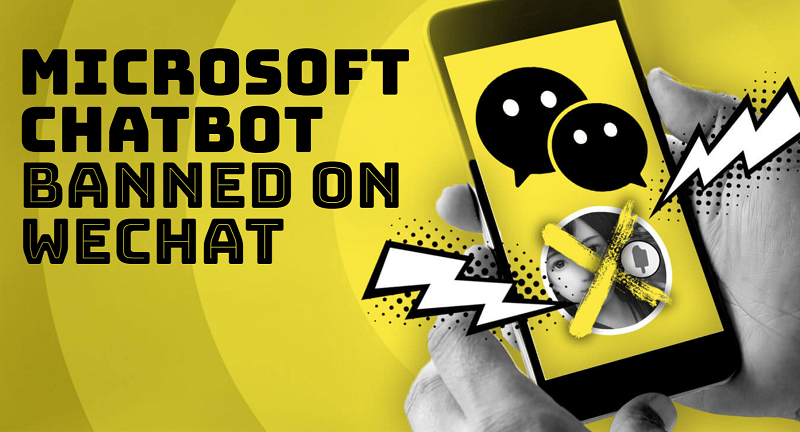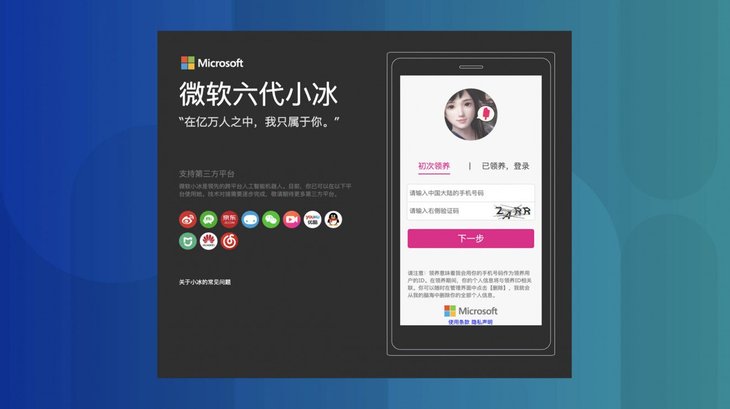To Tighten Online Speech Censorship, WeChat Bans Microsoft’s Chinese Chatbot
Harin - Jul 08, 2019

Tencent has decided to ban Xiaobing, Microsoft's Chinese chatbot for infringing a regulation targeting public social media accounts.
- The Ultimate Tech Betrayal: OpenAI's Nuclear Revenge Plot Against Sugar Daddy Microsoft
- Microsoft Notepad Gets Major Update: Bold Text, Hyperlinks, and Markdown Support
- Microsoft Surface: A Shift from Innovation to Stability?
There’s nothing strange when internet users using Chinese social media are suspended or banned permanently for touching politically sensitive topics. However, many found it surprising that a chatbot was banned.
Xiaobing, the Chinese chatbot from Microsoft, isn’t a virtual assistant like Siri or Alexa. Rather, it is a “virtual companion” that can converse with users.
But now, Tencent has decided to ban the chatbot for the third time. According to a message of Tencent on the WeChat page of Xiaobing, the chatbot had infringed a regulation targeting public social media accounts. However, what exactly it did to be considered as a violation was not stated.

In 2014 Tencent removed Xiaobing from WeChat for privacy concerns. In 2017, the chatbot was taken down from QQ for politically sensitive speech. It isn’t clear whether Xiaobing’s latest ban is permanent or temporary.
After the ban, functions on Xiaobing’s WeChat account are no longer accessible. Both Microsoft and Tencent have yet to comment on this matter.
People may not miss the Microsoft chatbot though, as it is not really popular in China. Xiaobing isn’t widely deployed on smart speakers like Alexa of Amazon since not many Chinese consumers use this device. For domestic smart speaker makers, they have their own voice assistants.
However, performing tasks is not the strength of Xiaobing. People who use Xiaobing mostly because of social reasons. For some, the bot is known for its sassy replies with sticker and memes sometimes as well as its ability to compose songs and write poems.
That’s why there are still some users who feel sad about their favorite chatbot’s disappearance.
On user on Weibo wrote:

People are guessing the reason for Xiaobing’s ban is related to politics as China is tightening online speech censorship.
But the political speech might not be the only cause as back in 2014, Xiaoping was removed from WeChat just a few days after its release for potentially leaking chat history and posing as a threat users’ privacy. Screenshots showing “lewd language” from the bot in conversations with users were also released by the company.
Microsoft hasn’t really been known for its chatbots. Back in 2016, Microsoft introduced a Twitter chatbot named Tay, hoping that through its interaction with users, it could learn something. However, less than a day after its debut, Tay started making racist comments, leading to it being taken down.
Featured Stories

Features - Jan 29, 2026
Permanently Deleting Your Instagram Account: A Complete Step-by-Step Tutorial

Features - Jul 01, 2025
What Are The Fastest Passenger Vehicles Ever Created?

Features - Jun 25, 2025
Japan Hydrogen Breakthrough: Scientists Crack the Clean Energy Code with...

ICT News - Jun 25, 2025
AI Intimidation Tactics: CEOs Turn Flawed Technology Into Employee Fear Machine

Review - Jun 25, 2025
Windows 11 Problems: Is Microsoft's "Best" OS Actually Getting Worse?

Features - Jun 22, 2025
Telegram Founder Pavel Durov Plans to Split $14 Billion Fortune Among 106 Children

ICT News - Jun 22, 2025
Neuralink Telepathy Chip Enables Quadriplegic Rob Greiner to Control Games with...

Features - Jun 21, 2025
This Over $100 Bottle Has Nothing But Fresh Air Inside

Features - Jun 18, 2025
Best Mobile VPN Apps for Gaming 2025: Complete Guide

Features - Jun 18, 2025
A Math Formula Tells Us How Long Everything Will Live
Read more

ICT News- Feb 18, 2026
Google's Project Toscana: Elevating Pixel Face Unlock to Rival Apple's Face ID
As the smartphone landscape evolves, Google's push toward superior face unlock technology underscores its ambition to close the gap with Apple in user security and convenience.

Mobile- Feb 16, 2026
Xiaomi Launches Affordable Tracker to Compete with Apple's AirTag
For users tired of ecosystem lock-in or high prices, the Xiaomi Tag represents a compelling, no-frills option that delivers core functionality at a fraction of the cost.

Mobile- Feb 17, 2026
Anticipating the Samsung Galaxy S26 and S26+: Key Rumors and Specs
The Samsung Galaxy S26 series is on the horizon, sparking excitement among tech enthusiasts.
Comments
Sort by Newest | Popular